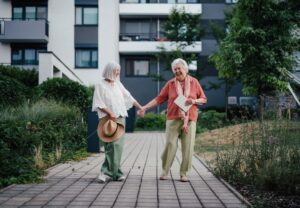If your parents or grandparents are suffering from dementia or Alzheimer’s, creating a safe and supportive home environment is crucial for their safety and health. Dementia not only impacts memory, but it also reduces your senses and ability to understand complex things, which causes confusion, anxiety, and other issues. To prevent that, you must make the right changes to your home environment. Here are 10 tips for creating a safe and supportive home environment for seniors with dementia. Reach out today to learn more about how we can help you enhance your golden years.
10 Tips for Creating a Safe and Supportive Home Environment for Seniors with Dementia
These tips help you create a safe and supportive home environment for your loved ones who are struggling with dementia or Alzheimer’s:
1. Evaluate your environment:
Inspect your house and look out for things that compromise the safety of loved ones. People with dementia struggle with cognitive abilities, depth perception, balance, coordination, memory, and strength. They also struggle to understand instructions, accurately interpret the world around them, and make the right decisions. Make sure you restrict access to those places/areas where your loved one is not safe, until you make the necessary changes to them.
2. Inspect each room:
You need to ensure that people with dementia have an easier time understanding a room and, more importantly, feel comfortable in it. For that, you can do several things, including:
• Walls should be painted in a pale color that reflects light and contrasts with the floor. Don’t cover windows during the day, allow natural light to come inside, and close them when needed or at night-time.
• Avoid big wall mirrors in the room because they make it difficult to process the depth of the room, and sometimes their reflection can lead to confusion, fear, and anxiety.
• Remove slippery throw rugs, curled edges on carpets, footstools, toys, etc.; all these tripping hazards and clutter need to be removed. Additionally, remove any cables or wires across the room, especially from the floor.
• Keep a list of phone numbers on their telephone that are easy to recognize, and if needed, add photos to those numbers to make them more recognizable.
• Clutter can be confusing for dementia patients as they have a hard time understanding it. So, keep the room decor minimal, which works best for them.
3. Inspect the bathrooms:
You may need to make some changes in your bathroom to ensure their safety and comfort:
• Remove locks from bathroom doors to prevent your loved ones from getting locked inside.
• If the basin is white, put some colorful stickers on it.
• If water can make tile or linoleum slippery, then put in some large non-skid bathmats.
• Install grab bars after consulting a therapist to find out which ones are right for your loved ones. Some grab bars also serve as towel bars, toilet paper holders, and in-shower shelves. You can add a shower or bath seat as well.
• To avoid scalding, install temperature-controlled water heaters.
• Avoid shiny floors that may cause confusion and make them think that the floor is wet, causing anxious or unsteady movements. Either change the floor or eliminate the shine.
4. Focus on bedrooms:
You need to ensure the bedroom is the most comfortable and safe place for your loved ones to relax and rest. To ensure that, do the following:
• Make sure the position of the bed is near the toilet, so they can easily see and go during the night. Keep the bathroom light or night light on to show the way to the bathroom.
• Don’t use electric blankets and heating pads if the person suffers incontinence.
• Consider a bed with height adjustment to lower the chances of a person falling from the bed.
• Add motion sensors around the bed or wall.
• Remove the lock from the loved one’s door to ensure they don’t get locked in or out.
5. Inspect the kitchen:
Make changes to your kitchen to ensure the safety of your loved ones. It includes:
• Dementia can lower the temperature sensitivity, which can create issues; so, consider automatic temperature-controlled water faucets.
• Unplug the stove or microwave from the electrical panel.
• Label the drawers and cabinets to make it easier to find contents.
• Put locks on drawers and cabinets that contain unsafe items.
• Keep the countertops and tables clean of excess clutter.
• Make sure the refrigerator contains fresh food and is safe to use. Other appliances like kettles, toasters, and boilers should have automatic turn-off systems.
6. Be prepared for emergencies:
Create a list of emergency phone numbers and addresses for local police and fire departments, hospitals, and poison control helplines.
7. Make sure safety devices work properly:
Make sure carbon monoxide and smoke detectors, and fire extinguishers at your home work properly and are inspected regularly. Replace their batteries twice a year during the day.
8. Support the person’s needs:
Instead of making them feel too restrictive at home, your home should encourage independence and social interaction, like clear areas for activities, relaxing in the living room, etc.
9. Inspect the living room:
Make some changes to your living room to ensure safety and relaxation for your loved ones. It includes:
• Increase lighting around the room by placing lamps and wall-mounted lights to keep your loved ones safe and show them the way around the house.
• Make sure seats are comfortable and of the right height so that they can easily sit and stand.
• Place the TV remote in an easy-to-find place, like on a table or chair in front of the TV.
• Place some memorabilia around the house to trigger positive memories, like photos of family, events, and holidays.
10. Inspect the outdoor area:
Not only inside, but the outdoor area of the house requires changes for the safety of loved ones with dementia:
• Install fences in your yard for family members to go outside, but keep the gates locked.
• Remove hazardous things like pesticides, paints, etc., or keep them locked in a secure cabinet.
• Keep walkways clear of fallen leaves and branches, ice, and snow.
• If you have a swimming pool, install fences and keep the gate locked. Add a pool alarm with a sensor that activates if someone trips in the water or around it.
• Alert neighbors to look out for your loved ones if they leave the house without dressing appropriately for the weather.
These tips will help you create a safe and supportive home environment for seniors with dementia for a better quality of life. Make sure you follow the above-mentioned tips to improve your home environment according to your loved ones’ needs.
Do you need help with senior care? Consult with senior care specialists in the Brooklyn clinic for better care services that help you ensure your loved ones are safe and healthy. Call us to book your appointment now!!!! Consult with our home care services to get a reliable companion care provider for your loved one, who ensures they get the best quality of care and companionship to live a peaceful, happy life. If you want to know more about adult day care services, the professionals at HouseCalls Home Care offer excellent resources for learning more about how to care for your aging loved ones. Reach out today to learn more about how we can help you enhance your golden years. Feel free to call HouseCalls Home Care at 718-922-9200 if you or a loved one requires compassionate and competent in-home care services. Our goal is to help you find the best support for your needs. You can also send an email to us at info@housecallshc.org for more information.




